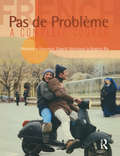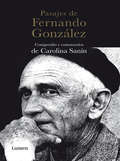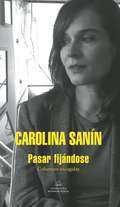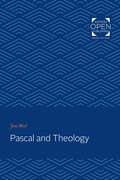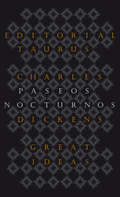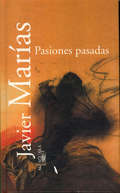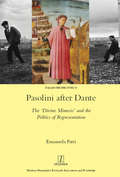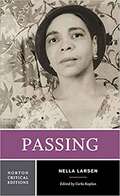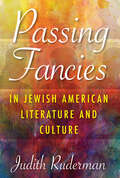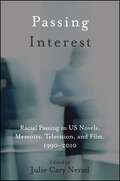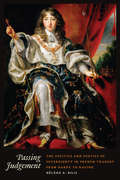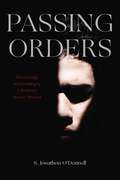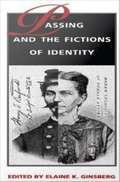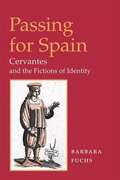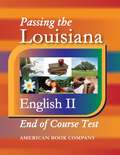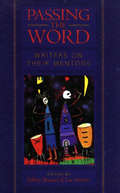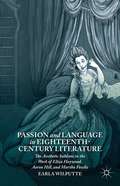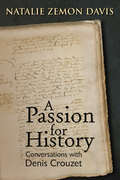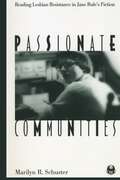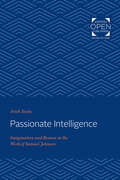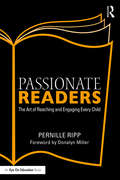- Table View
- List View
Pas de Probleme: Student Book
by Madeleine Hummler Brigitte Rix Elspeth NicholsPas de problème is a highly illustrative and communicative course designed for adults of all ages, from those with a 'rusty' recollection of school French to those advancing in the acquisition of a new language on a fast track. It will give students a thorough grounding in all the skills required to understand, speak, read and write contemporary French.The coursebook consists of 12 lively, illustrated chapters covering different broad themes and providing plenty of diverse material from technical to light-hearted. A wide range of registers is covered, from everyday idioms to formal letter-writing phrases. Each chapter contains the following: * sections reminding students of essential vocabulary and structures* explanations of new grammar in one single block for easy reference* reading and listening exercises* new vocabulary lists to aid self-study* role-playing exercises * internet addresses for further research* boxes containing helpful learning tips Audio files to accompany this book are available free of charge at www.routledge.com/cw/hummler
Pasajes de Fernando González
by Carolina Sanín"Quizás no pueda decirse, sin tergiversarlo fatalmente,qué fue lo que dijo Fernando González. La manera apropiadao posible de estudiar a quien han llamado elfilósofo paisa parece ser leerlo sin aspirar a explicarlo, yluego tratar de ver qué direcciones ha tomado uno dentrode su escritura. He escogido de la obra de Gonzálezlos fragmentos que me parecieron más representativos#aquellos a través de los cuales creí que el lector podríareconstruir los libros de los que se extrajeron# ytambién aquellos con los que resonó mi pensamiento.El conjunto resultante es otro libro que el autor escribió:el que escribió en mí. Ojalá siga escribiendo en los lectoresque ahora encuentre".Carolina Sanín
Pasajes de Fernando González
by Carolina Sanín PazUna antología de uno de los mejores escritores colombiano. "Quizás no pueda decirse, sin tergiversarlo fatalmente,qué fue lo que dijo Fernando González. La manera apropiadao posible de estudiar a quien han llamado elfilósofo paisa parece ser leerlo sin aspirar a explicarlo, yluego tratar de ver qué direcciones ha tomado uno dentrode su escritura. He escogido de la obra de Gonzálezlos fragmentos que me parecieron más representativos#aquellos a través de los cuales creí que el lector podríareconstruir los libros de los que se extrajeron# ytambién aquellos con los que resonó mi pensamiento.El conjunto resultante es otro libro que el autor escribió:el que escribió en mí. Ojalá siga escribiendo en los lectoresque ahora encuentre".Carolina Sanín
Pasar fijándose
by Carolina SaninUna recopilación de las mejores columnas de Carolina Sanín Pasar fijándose reúne las mejores columnas de Carolina Sanín. Publicadas desde el año 2008 en medios como El Espectador, Arcadia, Vice, Credencial y Semana Sostenible, no han dejado de cautivar a sus lectores, no sólo por los temas que aborda (feminismo, política, medio ambiente, cine, literatura, y muchos otros de difícil clasifificación), sino por el origen de esa variedad: la atención, el interés, la seriedad con que mira el mundo. "Desde que encontré la literatura y el pensamiento de Sanín no he dejado nunca de asombrarme ante el refinadísimo lente a través del cual mira las cosas. Su mirada es penetrante y fractal; desemboca en otras miradas que, a su vez, siguen derivándose. Ese sentido del infifinito es lo que siento cuando leo cualquier cosa que ella escribe. Un día me atreví a preguntarle: "¿Cómo haces?", y ella me contestó: "No sé, es como rezar"". Margarita Rosa de Francisco "Carolina Sanín fija la mirada para que sus palabras desnuden y limpien de obviedades a personas, temas y objetos. Y fija la mirada a partir de una curiosidad panorámica, que la convierte en una de las voces más originales, libres y retadoras hoy en día. Los lectores agradecemos el reto". Félix de Bedout La crítica ha dicho de Somos luces abismales "Una quisiera susurrar ciertas frases para sentir el ritmo subterráneo que marca el encuentro entre las palabras, la memoria y la imaginación, y que hace que la lectura de los textos de Carolina Sanín atraviese tanto la contemplación como la fábula". Gabriela Alemán "Uno no lee a Carolina Sanín. Uno se va con ella a ver, a pensar, a vivir". William Ospina "La originalidad de su indagación y la casi inconcebible belleza de su español hacen de Sanín una de las grandes escritoras de nuestro tiempo". Marianne Ponsford "En este libro se revela como una escritora cuya forma de lucidez es la poesía. Cada palabra es un placer". Alma Guillermoprieto "Cualquier discusión sobre la calidad de la prosa actual en español debería comenzar por Somos luces abismales. […] Sanín recupera y renueva la idea clásica del ensayo". Edmundo Paz Soldán
Pascal and Theology
by Jan MielOriginally published in 1970. The question of man's freedom to exercise his will—as active an issue among twentieth-century philosophers and theologians as it was in the Jesuit and Jansenist camps known to Pascal—is basic to this study. Pascal's theological thinking, which Professor Miel demonstrates to be the source of unity and coherence in virtually all phases of his thought, is preoccupied by a concern for man's limitations. In his analysis of Pascal's theology, Miel is concerned not only with characterizing Pascal's theological position but also with evaluating it in terms of the history of the church. In a concise and lucid review of the Christian doctrine of grace from the pre-Augustinians through the Renaissance, the author identifies the intellectual-theological atmosphere that created the need for Pascal's strong defense of Augustinian theology. Miel considers Pascal's Écrits sur la grâce, Lettres provincials, and Pensées as well as shorter compositions and correspondence. He establishes the content of Pascal's vision of grace and free will, noting both its originality and its sense of history. Most importantly, he asserts that Pascal's affirmation of Jansenism predated his association with Port Royal and, indeed, was basic to all his adult thought and work. The author finds in the writings of Pascal a style that anticipates twentieth-century theology, a sophistication that belies charges of Pascal's theological naïveté, and a concern to uphold rather than to undermine doctrinal traditions of the church.
Pascal the Philosopher
by Graeme HunterBlaise Pascal has always been appreciated as a literary giant and a religious guide, but has received only grudging recognition as a philosopher: philosophers have mistaken Pascal's harsh criticism of their discipline as a rejection of it. But according to Graeme Hunter, Pascal's critics have simply failed to grasp his lean, but powerful conception of philosophy. This accessibly written book provides the first introduction to Pascal's philosophy as an organic whole.Hunter argues that Pascal's aim is not merely to humble philosophy, but to save it from a kind of failure to which it is prone. He lays out Pascal's development of a more promising and fruitful path for philosophical inquiry, one that responded to the scientific, religious, and political upheaval of his time. Finally, Hunter illuminates Pascal's significance for contemporary readers, allowing him to emerge as the rare philosopher who is spiritual, literary, and rigorous all at once - both a brilliant controversialist and a thinker of substance.
Paseos nocturnos (Serie Great Ideas #Volumen 25)
by Charles DickensIdeas que han cambiado el mundo. A lo largo de la historia, algunos libros han cambiado el mundo. Han transformado la manera en que nos vemos a nosotros mismos y a los demás. Han inspirado el debate, la discordia, la guerra y la revolución. Han iluminado, indignado, provocado y consolado. Han enriquecido vidas, y también las han destruido. Taurus publica las obras de los grandes pensadores, pioneros, radicales y visionarios cuyas ideas sacudieron la civilización y nos impulsaron a ser quienes somos. Charles Dickens describe en Paseos nocturnos la época en la que, en busca de una cura para el insomnio, se dedicó a caminar por Londres a altas horas de la madrugada, descubriendo los problemas de indigencia, alcoholismo y vicio que escondían sus calles. Esta recopilación de ensayos muestra a Dickens como uno de los grandes visionarios de la ciudad, en toda su diversidad y crueldad. Comentarios sobre la colección Great Ideas:«De veras que la edición es primorosa y pocas veces contenido y continente pueden encontrarse mejor ensamblados y unidos. ¡Qué portadas! Para enmarcar. [...] Ante las Great Ideas, solo cabe quitarse el sombrero. ¡Chapeau!»ABC «Taurus propone un doble envite con este lanzamiento. Por un lado aumenta su compromiso con el ensayo; por otro, recupera el gusto por la estética. A los volúmenes se les ha proporcionado una portada delicada y cuidada (copian el original británico) que invita a la lectura.»La Razón «Un fenómeno editorial.»The Guardian «Aparte de los contenidos, en general muy bien elegidos, son tan bonitos que si los ven seguro que cae alguno.»El País «Ideas revolucionarias, crónicas de exploraciones, pensamientos radicales? vuelven a la vida en estas cuidadísimas ediciones, muy atractivas para nuevos lectores.»Mujer Hoy «Grandes ideas bien envueltas. De Cicerón a Darwin, esta colección entra por los ojos.»Rolling Stone «Original y bella iniciativa la emprendida por Taurus con su colección Great Ideas.»Cambio 16 «Hay libros inmortales, libros únicos que contienen pensamientos y reflexiones capaces de cambiar el mundo, tesoros en miniatura reagrupados en la colección Great ideas.»Diario de León
Pasiones pasadas
by Javier MaríasPasiones pasadas fue el primer libro de artículos de Javier Marías, y en él ya se vio que el autor no trata la realidad de manera muy distinta que la ficción. Pasiones pasadas(1991), la primera recopilación de artículos seleccionados por el autor para ser publicados en forma de libro, es la muestra primigenia de una labor que aún no ha abandonado y en la que se mueve como pez en el agua. Aquí, organizados en apartados temáticos, podemos encontrar textos viajeros, en los que Javier Marías nos lleva a sus ciudades -Venecia y Oxford, Barcelona y Madrid-; otros de afinidades y afectos, como aquellos en los que nos habla de personajes y amigos -Benet y Villena, su tío el cineasta Jess Frank y su amigo Aliocha Coll-, pero también escritos sobre las particularidades de la sociedad española y sobre el difícil arte de escribir y no morir en el intento. En todos ellos, fruto según su autor de «la vehemencia o pasión de un instante», encontramos, tras su prosa inconfundible, una mirada que, aun siendo capaz de distanciarse, tiene como objetivo comprometerse, implicarse, opinar. Reseña: «Al recorrer en este libro trabajos de los últimos seis años, se aprecia bien en qué medida una labor como la suya contribuye a elevar, desde la prensa más diversa, la temperatura intelectual del país.»Ignacio Echevarría, El País
Pasolini after Dante: The 'Divine Mimesis' and the Politics of Representation (Legenda)
by Emanuela PattiWhat role did Dante play in the work of Pier Paolo Pasolini (1922-1975)? His unfinished and fragmented imitation of the Comedia, La Divina Mimesis, is only one outward sign of what was a sustained dialogue with Dante on representation begun in the early 1950s. During this period, the philologists Gianfranco Contini (1912-1990) and Erich Auerbach (1892-1957) played a crucial role in Pasolini’s re-thinking of ‘represented reality’, suggesting Dante as the best literary, authorial and political model for a generation of postwar Italian writers. This emerged first as ‘Dantean realism’ in Pasolini’s prose and poetry, after Contini’s interpretation of Dante and of his plurilingualism, and then as ‘figural realism’ in his cinema, after Auerbach’s concepts of Dante’s figura and ‘mingling of styles’. Following the evolution of Pasolini’s mimetic ideal from these formative influences through to La Divina Mimesis, Emanuela Patti explores Pasolini’s politics of representation in relation to the ‘national-popular’, the ‘questione della lingua’ and the Italian post-war debates on neorealism, while also providing a new interpretation of some of his major literary and cinematic works.
Passing (Norton Critical Editions)
by Carla Kaplan Nella LarsenNella Larsen is a central figure in African American, Modernist, and women’s literature. <p><p> Larsen's status as a Harlem Renaissance woman writer was rivaled by only Zora Neale Hurston’s. This Norton Critical Edition of her electrifying 1929 novel includes Carla Kaplan’s detailed and thought-provoking introduction, thorough explanatory annotations, and a Note on the Text. An unusually rich “Background and Contexts” section connects the novel to the historical events of the day, most notably the sensational Rhinelander/Jones case of 1925. <p><p> Fourteen contemporary reviews are reprinted, including those by Alice Dunbar-Nelson, Mary Griffin, and W. E. B. Du Bois. Published accounts from 1911 to 1935―by Langston Hughes, Juanita Ellsworth, and Caleb Johnson, among others―provide a nuanced view of the contemporary cultural dimensions of race and passing, both in America and abroad. Also included are Larsen’s statements on the novel and on passing, as well as a generous selection of her letters and her central writings on “The Tragic Mulatto(a)” in American literature. Additional perspective is provided by related Harlem Renaissance works. <p><p> “Criticism” provides fifteen diverse critical interpretations, including those by Mary Helen Washington, Cheryl A. Wall, Deborah E. McDowell, David L. Blackmore, Kate Baldwin, and Catherine Rottenberg. A Chronology and Selected Bibliography are also included.
Passing Fancies in Jewish American Literature and Culture (Jewish Literature and Culture)
by Judith RudermanThis scholarly study explores the conflicting forces of assimilation and cultural heritage in literary portrayals of Jewish American identity.In Passing Fancies in Jewish American Literature and Culture Judith Ruderman takes on the fraught question of who passes for Jewish in American literature and culture. In today’s contemporary political climate, religious and racial identities are being reconceived as responses to culture and environment, rather than essential qualities. Many Jews continue to hold conflicting ideas about their identity?seeking deep engagement with Jewish history and the experiences of the Jewish people while holding steadfastly to the understanding that identity is fluid and multivalent.Looking at carefully chosen texts from American literature, Ruderman elaborates on the strategies Jews have used to “pass” from the late nineteenth century to the present?nose jobs, renaming, clothing changes, religious and racial reclassification, and even playing baseball. While traversing racial and religious identities has always been a feature of America’s nation of immigrants, Ruderman shows how the complexities of identity formation and deformation are critically relevant during this important cultural moment.
Passing Interest: Racial Passing in US Novels, Memoirs, Television, and Film, 1990-2010 (SUNY series in Multiethnic Literatures)
by Julie Cary NeradThe first volume to focus on the trope of racial passing in novels, memoirs, television, and films published or produced between 1990 and 2010, Passing Interest takes the scholarly conversation on passing into the twenty-first century. With contributors working in the fields of African American studies, American studies, cultural studies, film studies, literature, and media studies, this book offers a rich, interdisciplinary survey of critical approaches to a broad range of contemporary passing texts. Contributors frame recent passing texts with a wide array of cultural discourses, including immigration law, the Post-Soul Aesthetic, contemporary political satire, affirmative action, the paradoxes of "colorblindness," and the rhetoric of "post-racialism." Many explore whether "one drop" of blood still governs our sense of racial identity, or to what extent contemporary American culture allows for the racially indeterminate individual. Some essays open the scholarly conversation to focus on "ethnic" passers—individuals who complicate the traditional black-white binary—while others explore the slippage between traditional racial passing and related forms of racial performance, including blackface minstrelsy and racial masquerade.
Passing Judgment: The Politics and Poetics of Sovereignty in French Tragedy from Hardy to Racine
by Helene E. BilisThe royal judge was an archetypal character in French tragedy during the 17th century. This figure impersonated the king by asserting his judicial authority and bringing order to an otherwise chaotic world.In Passing Judgment, Hélène Bilis examines how an overlooked character-type--the royal judge--remained a constant of the tragic genre throughout the 17th century, although the specifics of his role and position fluctuated as playwrights experimented with changing models of sovereignty onstage. Her readings analyze how this royal decision-maker stood at the intersection of political and theatrical debates, and evolved through a process of trial and error in which certain portrayals of kingship were deemed obsolete and were discarded, while others were promoted as culturally allowable and resonant. In tracing the royal judge's persistent presence and transformation, Bilis argues that we can better grasp the weighty political stakes of theatrical representations under the ancien régime.
Passing Orders: Demonology and Sovereignty in American Spiritual Warfare
by S. Jonathon O'DonnellDemonization has increasingly become central to the global religious and political landscape. Passing Orders interrogates this centrality through an analysis of evangelical “spiritual warfare” demonologies in contemporary America. Situating spiritual warfare as part of broader frameworks of American exceptionalism, ethnonationalism, and empire management, author S. Jonathon O’Donnell exposes the theological foundations of the systems of queer- and transphobia, anti-blackness, Islamophobia, and settler colonialism that justify the dehumanizing practices of the current U.S. political order.O’Donnell argues that demonologies are not only tools of dehumanization but also ontological and biopolitical systems that create and maintain structures of sovereign power, or orthotaxies—models of the “right ordering” of space, time, and bodies that stratify humanity into hierarchies of being and nonbeing. Alternative orders are demonized as passing, framed as counterfeit, transgressive, and transient. Yet these orders refuse to simply pass on, instead giving strength to deviant desires that challenge the legitimacy of sovereign violence. Critically examining this challenge in the demonologies of three figures—Jezebel, the Islamic Antichrist, and Leviathan—Passing Orders re-imagines demons as a surprising source of political and social resistance, reflecting fragile and fractious communities bound by mutual passing and precarity into strategic coalitions of solidarity, subversion, and survival.
Passing and the Fictions of Identity
by Elaine K. GinsbergPassing refers to the process whereby a person of one race, gender, nationality, or sexual orientation adopts the guise of another. Historically, this has often involved black slaves passing as white in order to gain their freedom. More generally, it has served as a way for women and people of color to access male or white privilege. In their examination of this practice of crossing boundaries, the contributors to this volume offer a unique perspective for studying the construction and meaning of personal and cultural identities. These essays consider a wide range of texts and moments from colonial times to the present that raise significant questions about the political motivations inherent in the origins and maintenance of identity categories and boundaries. Through discussions of such literary works as Running a Thousand Miles for Freedom, The Autobiography of an Ex-Coloured Man, Uncle Tom's Cabin, The Hidden Hand, Black Like Me, and Giovanni's Room, the authors examine issues of power and privilege and ways in which passing might challenge the often rigid structures of identity politics. Their interrogation of the semiotics of behavior, dress, language, and the body itself contributes significantly to an understanding of national, racial, gender, and sexual identity in American literature and culture. Contextualizing and building on the theoretical work of such scholars as Judith Butler, Diana Fuss, Marjorie Garber, and Henry Louis Gates Jr. , Passing and the Fictions of Identity will be of value to students and scholars working in the areas of race, gender, and identity theory, as well as U. S. history and literature. Contributors. Martha Cutter, Katharine Nicholson Ings, Samira Kawash, Adrian Piper, Valerie Rohy, Marion Rust, Julia Stern, Gayle Wald, Ellen M. Weinauer, Elizabeth Young
Passing for Spain: CERVANTES AND THE FICTIONS OF IDENTITY
by Barbara FuchsPassing for Spain charts the intersections of identity, nation, and literary representation in early modern Spain. Barbara Fuchs analyzes the trope of passing in Don Quijote and other works by Cervantes, linking the use of disguise to the broader historical and social context of Counter-Reformation Spain and the religious and political dynamics of the Mediterranean Basin. In five lucid and engaging chapters, Fuchs examines what passes in Cervantes's fiction: gender and race in Don Quijote and "Las dos doncellas"; religion in "El amante liberal" and La gran sultana; national identity in the Persiles and "La española inglesa." She argues that Cervantes represents cross-cultural impersonation -- or characters who pass for another gender, nationality, or religion -- as challenges to the state's attempts to assign identities and categories to proper Spanish subjects. Fuchs demonstrates the larger implications of this challenge by bringing a wide range of literary and political texts to bear on Cervantes's representations. Impeccably researched, Passing for Spain examines how the fluidity of individual identity in early modern Spain undermined a national identity based on exclusion and difference.
Passing the Louisiana English II End-of- Course Test
by Rob HunterPrep for this important language arts test.
Passing the Word: Writers on Their Mentors (The\writer's Studio Ser. #Vol. 3)
by Lee Martin Jeffrey SkinnerIn this anthology, distinguished writers explore the relevance of mentors in their education and development as writers. Each author contributes an essay and a story or poem, which together give a unique sense of the forces that shape a writer's craft and vision.
Passion and Language in Eighteenth-Century Literature
by Earla WilputteProviding imaginatively contextualized close readings, this study focuses on three key eighteenth-century writers - Haywood, Hill and Fowke. Wilputte traces the development of the passionate language of these writers whose lives, writing careers, and interests intersected from 1720 to 1724 in the "Hillarian" coterie.
Passion for History: Conversations with Denis Crouzet (Early Modern Studies #4)
by Natalie Zemon Davis Denis CrouzetThe pathbreaking work of renowned historian Natalie Zemon Davis has added profoundly to our understanding of early modern society and culture. She rescues men and women from oblivion using her unique combination of rich imagination, keen intelligence, and archival sleuthing to uncover the past. Davis brings to life a dazzling cast of extraordinary people, revealing their thoughts, emotions, and choices in the world in which they lived. Thanks to Davis we can meet the impostor Arnaud du Tilh in her classic, The Return of Martin Guerre, follow three remarkable lives in Women on the Margins, and journey alongside a traveler and scholar in Trickster Travels as he moves between the Muslim and Christian worlds.In these conversations with Denis Crouzet, professor of history at the Sorbonne and well-known specialist on the French Wars of Religion, Natalie Zemon Davis examines the practices of history and controversies in historical method. Their discussion reveals how Davis has always pursued the thrill and joy of discovery through historical research. Her quest is influenced by growing up Jewish in the Midwest as a descendant of emigrants from Eastern Europe. She recounts how her own life as a citizen, a woman, and a scholar compels her to ceaselessly examine and transcend received opinions and certitudes. Davis reminds the reader of the broad possibilities to be found by studying the lives of those who came before us, and teaches us how to give voice to what was once silent.
Passion for History: Conversations with Denis Crouzet (Early Modern Studies)
by Natalie Zemon Davis Denis CrouzetThe pathbreaking work of renowned historian Natalie Zemon Davis has added profoundly to our understanding of early modern society and culture. She rescues men and women from oblivion using her unique combination of rich imagination, keen intelligence, and archival sleuthing to uncover the past. Davis brings to life a dazzling cast of extraordinary people, revealing their thoughts, emotions, and choices in the world in which they lived. Thanks to Davis we can meet the impostor Arnaud du Tilh in her classic, The Return of Martin Guerre, follow three remarkable lives in Women on the Margins, and journey alongside a traveler and scholar in Trickster Travels as he moves between the Muslim and Christian worlds.In these conversations with Denis Crouzet, professor of history at the Sorbonne and well-known specialist on the French Wars of Religion, Natalie Zemon Davis examines the practices of history and controversies in historical method. Their discussion reveals how Davis has always pursued the thrill and joy of discovery through historical research. Her quest is influenced by growing up Jewish in the Midwest as a descendant of emigrants from Eastern Europe. She recounts how her own life as a citizen, a woman, and a scholar compels her to ceaselessly examine and transcend received opinions and certitudes. Davis reminds the reader of the broad possibilities to be found by studying the lives of those who came before us, and teaches us how to give voice to what was once silent.
Passionate Communities: Reading Lesbian Resistance in Jane Rule's Fiction (The Cutting Edge: Lesbian Life and Literature Series)
by Marilyn R. SchusterIn this new full-length study of Jane Rule's life and work, Marilyn Schuster argues that Rule's novels provide a way of "writing and reading lesbian" that resists and subverts dominant discourses of gender and sexuality-both those of mainstream culture and of political and sexual subcultures. From her earliest novel, Desert of the Heart (1964), Rule's fiction has provided a challenge to the concept of a fixed identity and to the identity politics founded on such a concept. Incorporating all of Jane Rule's early work-including unpublished manuscripts, letters, magazine and newspaper columns, as well as fan mail she received-Schuster also draws on interviews, conversations, and personal encounters with the author to elicit the ways in which Rule interrogates the meanings and politics of sexuality, the relationship between sexuality and language, and the stakes of communities in individual claims on identity. Passionate Communities is a thorough, engaging, and long-overdue study of an important voice in lesbian literature and gay and lesbian politics.
Passionate Intelligence: Imagination and Reason in the Work of Samuel Johnson
by Arieh SachsOriginally published in 1967. Professor Sachs shows the inner coherence of Samuel Johnson's thought by pointing out the interconnectedness of his remarks on religious, moral, aesthetic, political, and psychological subjects. Reason and imagination, the central concepts in the Johnsonian ethos, are elucidated with reference to "vacuity," "attention," "novelty," "diversity," and other words to which Johnson attached special significance. Johnson emerges as an original thinker of the English Christian-humanist heritage; he "is to be read in the same spirit as Pascal." Primarily concerned with the relation between Johnson's ideas and the long tradition of which they are the culmination, Sachs also emphasizes the relevance of Johnson's thought to the twentieth century.
Passionate Playgoing in Early Modern England
by Allison P. HobgoodAllison P. Hobgood tells a new story about the emotional experiences of theatregoers in Renaissance England. Through detailed case studies of canonical plays by Shakespeare, Jonson, Kyd and Heywood, the reader will discover what it felt like to be part of performances in English theatre and appreciate the key role theatregoers played in the life of early modern drama. How were spectators moved - by delight, fear or shame, for example - and how did their own reactions in turn make an impact on stage performances? Addressing these questions and many more, this book discerns not just how theatregoers were altered by drama's affective encounters, but how they were undeniable influences upon those encounters. Overall, Hobgood reveals a unique collaboration between the English world and stage, one that significantly reshapes the ways we watch, read and understand early modern drama.
Passionate Readers: The Art of Reaching and Engaging Every Child
by Pernille RippHow do we inspire students to love reading and discovery? In Passionate Readers: The Art of Reaching and Engaging Every Child, classroom teacher, author, and speaker Pernille Ripp reveals the five keys to creating a passionate reading environment. You’ll learn how to… Use your own reading identity to create powerful reading experiences for all students Empower your students and their reading experience by focusing on your physical classroom environment Create and maintain an enticing, well-organized, easy-to-use classroom library; Build a learning community filled with choice and student ownership; and Guide students to further develop their own reading identity to cement them as life-long, invested readers. Throughout the book, Pernille opens up about her own trials and errors as a teacher and what she’s learned along the way. She also shares a wide variety of practical tools that you can use in your own classroom, including a reader profile sheet, conferring sheet, classroom library letter to parents, and much more. These tools are available in the book and as eResources to help you build your own classroom of passionate readers.
